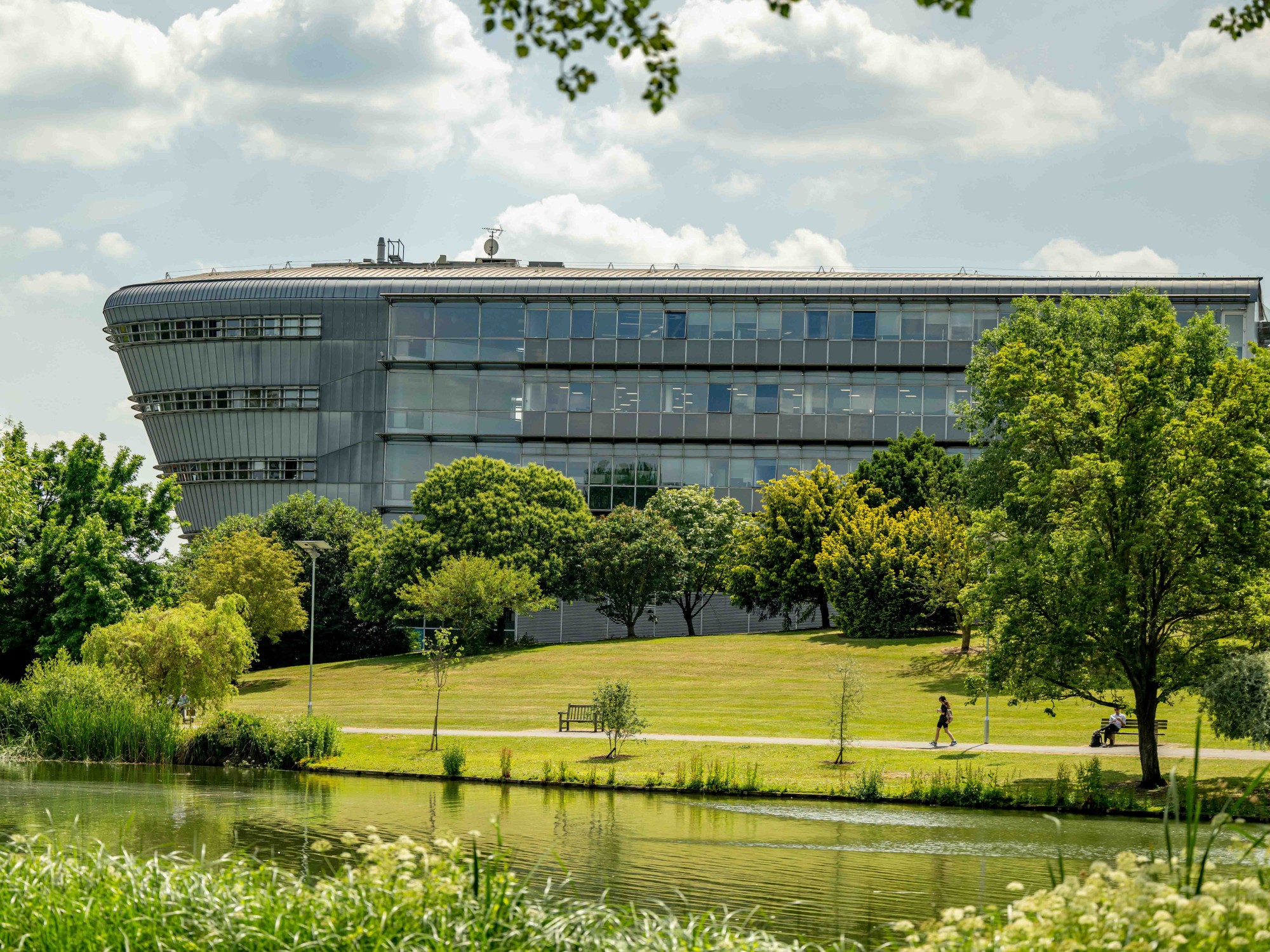
- Civil and Environmental Engineering
PhD Civil and Environmental Engineering
Our Civil and Environmental Engineering PhD programme delves into advanced research and specialised study within the field. You'll be equipped with the knowledge, skills, and expertise to become a leader in your field, capable of addressing the complex challenges facing our built and natural environments.
Why choose this
programme?
Your PhD will be conducted as part of a research group within our School of Sustainability, Civil and Environmental Engineering. You’ll work to create smart and clean urban environments, dealing with challenges such as constraints of space and ageing infrastructure.
By sharing resources with other departments and schools across the University, we can support you in pursuing multidisciplinary and multi-scale research. This spans traditional subject boundaries and enables science-led inquiry to create engineered solutions to industrially relevant problems, both nationally and globally.
You’ll benefit from our excellent track record for graduate employability: 100 per cent of our civil and environmental engineering postgraduate research students are in employment or further study, with an average salary of £39,000 (Graduate Outcomes 2022). We also offer a wide range of studentships through partnerships with leading companies.
In the Research Excellence Framework (REF) 2021, the University of Surrey ranks 15th in the UK for research power for engineering and top 20 in the UK for the overall quality of research outputs (research papers and other published works).
What you will study
On this programme, your research will address the need for safe and sustainable environments in which we can all live and work. Your research can be about anything covered by one of our four research centres, or within the wider research interests of the Faculty of Engineering and Physical Sciences.
You’ll be assigned two supervisors who will guide you through your PhD and meet with you at least once a month. Your supervisors will be responsible for your progress, professional development and personal welfare. They’ll also be able to support you with preparing your work for publication and for research seminar presentations.
You’ll normally spend the first few months of your studies exploring the existing literature within your area of interest and establishing the research question you’ll address. After your first year, you’ll take a confirmation exam, and produce a report setting out your research objectives and what you’ve done so far, as well as a plan for how you’ll complete your final thesis. Your final assessment will be on your written thesis, and by a viva examination with both internal and external examiners.
As a research student, you’ll be able to attend our regular research seminars, where you can find out more about what your fellow researchers are working on and try your hand at presenting. We encourage our research students to interact with all our research staff throughout their programmes.
Assessment
Your final assessment will be based on the presentation of your research in a written thesis, which will be discussed in a viva examination with at least two examiners. You have the option of preparing your thesis as a monograph (one large volume in chapter form) or in publication format (including chapters written for publication), subject to the approval of your supervisors.
Location
This course is based at Stag Hill campus. Stag Hill is the University's main campus and where the majority of our courses are taught.
See a full list of all our academic staff within the School of Sustainability, Civil and Environmental Engineering.
Research support
The professional development of postgraduate researchers is supported by the Doctoral College, which provides training in essential skills through its Researcher Development Programme of workshops, mentoring and coaching. A dedicated postgraduate careers and employability team will help you prepare for a successful career after the completion of your PhD.
Facilities
You’ll be given office space and a computer within the School of Sustainability, Civil and Environmental Engineering, normally with other researchers working on similar or related projects. From here, you’ll be able to carry out computer-based desk studies, and access central supercomputer systems to run simulations or other analytical models.
If your research involves experimental studies, you’ll be given access to appropriate laboratories along with the support and training to use them. Each laboratory has its own trained technicians who will keep you safe and help you with any problems.
If your research requires fieldwork outside the office or the lab, your supervisor will work with you to help you carry out your studies safely and efficiently.
Some of the laboratories we have on site include:
- A structures and materials laboratory, where you can manufacture and assess structural elements, including a mechanical testing suite with static/fatigue capacity from 1N to 1000kN at size scales of 1mm to 5m in tension/compression/flexure
- The SAGE laboratory, which can characterise soils and soil-structure interactions under controlled environmental conditions
- Laboratories within the Centre for Environmental and Health Engineering, which include: water resources surveillance, modelling and management; water treatment, supply and regulation; wastewater treatment, disposal and safe reuse; and pollution control and waste management. We also have a cryogenic mill and accelerated weathering chamber to enable studies of environmental weathering and degradation of plastics
- The Air Quality Lab, a world-class air quality monitoring facility housing advanced equipment that can measure trace levels of gases and particles, including nano/ultrafine particles
- The GeoInformation Laboratory, our research hub for geospatial analysis, remote sensing and geo-simulation. Researchers have dedicated computing resources, including powerful workstations, state-of-the art software and data infrastructure
- Wind tunnel facilities for pollution dispersion modelling.
UK qualifications
Applicants are expected to hold a first or upper second-class (2:1) UK degree in a relevant discipline (or equivalent overseas qualification), or a lower-second (2:2) UK degree plus a good UK masters degree - distinction normally required (or equivalent overseas qualification).
English language requirements
IELTS Academic: 6.5 or above (or equivalent) with 6.0 in each individual category.
These are the English language qualifications and levels that we can accept.
If you do not currently meet the level required for your programme, we offer intensive pre-sessional English language courses, designed to take you to the level of English ability and skill required for your studies here.
Selection process
Selection is based on applicants:
- Meeting the expected entry requirements
- Being shortlisted through the application screening process
- Completing a successful interview
- Providing suitable references.
Fees per year
Explore UKCISA's website for more information if you are unsure whether you are a UK or overseas student. View the list of fees for all postgraduate research courses.
* Please note: any start date other than September will attract a pro-rata fee for that year of entry (75 per cent for January, 50 per cent for April and 25 per cent for July).
October 2025 - Full-time
- UK
- £5,006
- Overseas
- £27,200
October 2025 - Part-time
- UK
- £2,503
- Overseas
- £13,600
July 2025 - Full-time
- UK
- £1,197
- Overseas
- £6,550
July 2025 - Part-time
- UK
- £598
- Overseas
- £3,275
January 2026 - Full-time
- UK
- £3,755
- Overseas
- £20,400
January 2026 - Part-time
- UK
- £1,877
- Overseas
- £10,200
April 2026 - Full-time
- UK
- £2,503
- Overseas
- £13,600
April 2026 - Part-time
- UK
- £1,252
- Overseas
- £6,800
- Annual fees will increase by 4% for each year of study, rounded up to the nearest £100 (subject to legal requirements).
Additional costs
There are additional costs that you can expect to incur when studying at Surrey.
Funding
A Postgraduate Doctoral Loan can help with course fees and living costs while you study a postgraduate doctoral course.
Studentships
Browse our frequently updated list of funded studentships open for applications.
Application process
Applicants are advised to contact potential supervisors before they submit an application via the website. Please refer to section two of our application guidance.
After registration
Students are initially registered for a PhD with probationary status and, subject to satisfactory progress, subsequently confirmed as having PhD status.
About the University of Surrey
Need more information?
Contact our Admissions team or talk to a current University of Surrey student online.
Code of practice for research degrees
Surrey’s postgraduate research code of practice sets out the University's policy and procedural framework relating to research degrees. The code defines a set of standard procedures and specific responsibilities covering the academic supervision, administration and assessment of research degrees for all faculties within the University.
Download the code of practice for research degrees (PDF).
Terms and conditions
When you accept an offer to study at the University of Surrey, you are agreeing to follow our policies and procedures, student regulations, and terms and conditions.
We provide these terms and conditions in two stages:
- First when we make an offer.
- Second when students accept their offer and register to study with us (registration terms and conditions will vary depending on your course and academic year).
View our generic registration terms and conditions (PDF) for the 2024/25 academic year, as a guide on what to expect.
Disclaimer
This online prospectus has been published in advance of the academic year to which it applies.
Whilst we have done everything possible to ensure this information is accurate, some changes may happen between publishing and the start of the course.
It is important to check this website for any updates before you apply for a course with us. Read our full disclaimer.



